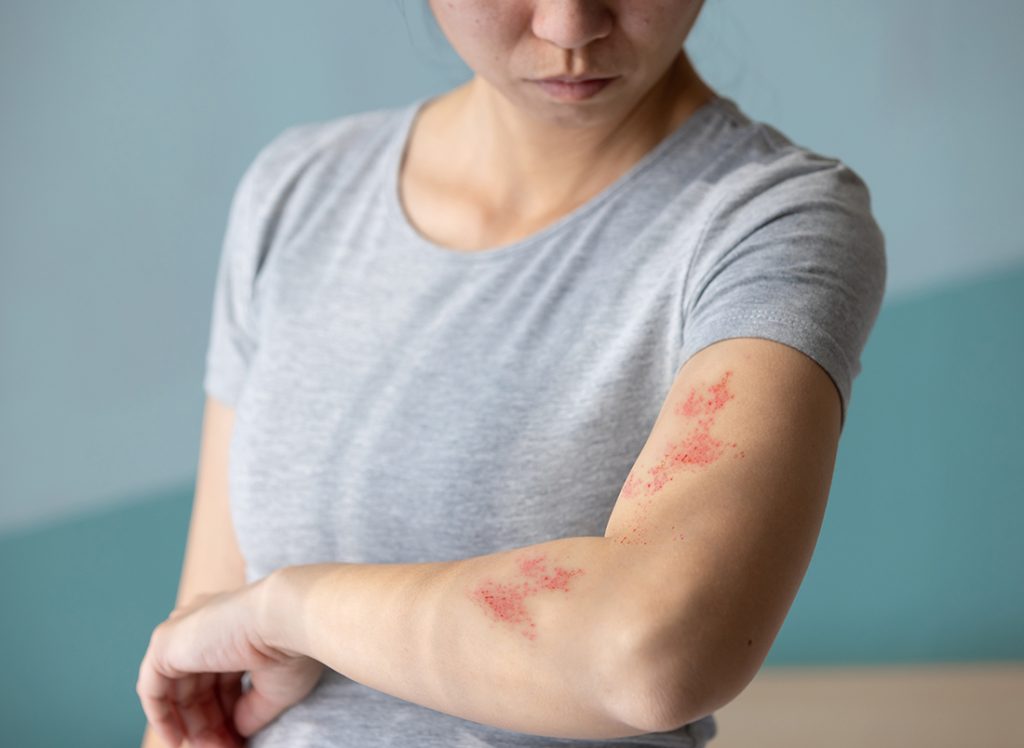Dr Philippa Kaye on Shingles

Most of us have had chickenpox and 1 in 4 will get shingles, Dr Philippa Kaye explains. But is it contagious and is there a vaccine that can help?
Holly had been in pain for the past two days with a burning sensation underneath her right breast and on the right side of her back.
She had kept looking at where it was hurting and asking her husband to look, but it was only this morning that she had seen anything. She had a rash and a tingling, burning sensation.
Holly had shingles – and as she came to see me within 72 hours of her symptoms starting, I was able to start her on some anti-viral medication. Through the Pharmacy First scheme pharmacists are now also able to prescribe antiviral medication for shingles.
What is shingles? Dr Philippa Kaye explains…
Shingles is a reactivation of the virus which causes chickenpox. Holly couldn’t remember having had chickenpox but most of us have had it as children, though it may have been mild. The virus then remains dormant, or sleeping in the body in one nerve root.
In shingles, the virus has become reactivated in that nerve, so you get the rash, not over the whole body, but in the area of skin supplied by that particular nerve. It is quite a common condition, with 1 in 4 people having shingles at some point in their lives.
The reason why the virus reactivates is not always known. Sometimes it happens when you have had another illness or a recent stressor. But in many people the virus remains dormant without any symptoms at all, and does not always result in an episode of shingles.
Shingles rash
The rash of shingles tends to occur on one side of the body, often on the face, chest or abdomen. On the chest or tummy it occurs in a band on one side and the pain tends to start up to 2-3 days before the rash develops.
It can be burning, like Holly’s. Other words patients often use include a gnawing pain, tingling, a pins-and-needles sensation, a dull pain or a sharp stabbing pain which can be constant or come and go.
The rash reddens and then small fluid-filled blisters called vesicles appear.
The rash can be itchy. Over the next few days, the blisters scab over before the rash disappears. The pain can persist for longer.
Wear loose clothing that won’t irritate your skin. Keeping cool, or even using a wrapped ice pack (or bag of frozen peas) on the rash can help with pain and itching. Calamine lotion or aloe vera gel can also be soothing.
Shingles treatment
The mainstay of treatment for shingles is with antiviral medication such as aciclovir.
Antiviral medications are not the same as antibiotics; antibiotics work to kill bacteria, so getting rid of an infections. Antivirals don’t kill off the virus but slow down how fast it can replicate, meaning that the episode of shingles doesn’t tend to be so severe and doesn’t last as long. The virus then becomes dormant again in the same nerve root. This means you can get another episode of shingles at some point later.
The pain of shingles can persist long after the rash has gone. This does not always occur but the burning, gnawing nerve pain can cause significant discomfort. Post-herpetic nerve pain is treated initially with paracetamol but if this isn’t sufficient then neuropathic painkillers are offered.
These include amitriptyline, which at high doses is an antidepressant but in lower doses works for pain, and pregabalin, an anti-seizure medication that also works for pain.
Is shingles contagious?
Yes and no. You cannot catch shingles from someone who has shingles. But… if you have not had chickenpox then you can catch chickenpox from someone who has shingles.
However if the rash is covered up, the risk of catching chickenpox is small and is only present from when the rash appears until it has scabbed over.
So the answer is both yes and no. You can’t catch shingles, only chickenpox if you’ve not had it. Shingles is a reactivation of your own chickenpox.
Shingles vaccination
There is a vaccination against shingles available which both reduces your chances of getting shingles, even if you have had it before, and reduces the risk of developing complications such as long term nerve pain.
Who can get the shingles vaccine?
- Adults aged 65 – if you turned 65 after September 1. 2023 you will be eligible until age 80.
- Adults aged 70-79
- People over 50 with severely compromised immune systems, for example if you have recently had a stem cell transplant or if you have particular blood cancers.
The age groups above may appear complicated, but that is due to an intermediate stage as the vaccine is rolled out by doctors.
Advice given in this article and on the My Weekly website and magazines is not meant to replace personalised medical advice from your doctor. If you have any health concerns please see your doctor.
Article written on July 9, 2020; article reviewed and updated on March 26, 2024
Each week we’ll ask Dr Philippa Kaye to talk about a prominent health issue, so look out for more articles in our health and wellbeing section in coming weeks. Read her advice on Ovarian Cancer, Endometriosis and Long Covid now.






